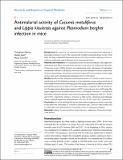| dc.description.abstract | Background: The search for new antimalarial drugs has become progressively urgent due to
plasmodial resistance to most of the commercially available antimalarial drugs. As part of this
effort, the study evaluated the antimalarial activity of Cucumis metuliferus and Lippia kituiensis,
which are traditionally used in Tanzania for the treatment of malaria.
Materials and methods: In vivo antimalarial activity was assessed using the 4-day suppressive
antimalarial assay. Mice were infected by injecting via tail vein 1×107 erythrocytes infected by
Plasmodium berghei ANKA. Extracts were administered orally; chloroquine (10 mg/kg/day)
and dimethyl sulfoxide (5 mL/kg/day) were used as positive and negative controls, respectively.
The level of parasitemia, survival time, packed cell volume (PCV) and variation in body weight
of mice were used to determine the antimalarial activity of the extract.
Results: The ethyl acetate, methanolic and chloroform extracts of C. metuliferus and L. kituiensis
significantly (p<0.05) inhibited parasitemia in a dose-dependent manner and prevented loss of
body weight at the dose levels of 600 mg/kg and 1500 mg/kg, respectively. In addition, the extracts
prolonged the mean survival time of P. berghei-infected mice compared to the non-treated control.
The plant extracts did not show reduction of PCV except at the low dose of 300 mg/kg. The
highest suppression was recorded at the dose level of 1,500 mg/kg. At this dose, C. metuliferus in
chloroform, methanolic and ethyl acetate extracts had percentage suppression of 98.55%, 88.89%
and 84.39%, respectively, whereas L. kituiensis in ethyl acetate, chloroform and methanolic
extracts exhibited suppression of the pathogens of 95.19%, 93.88% and 74.83%, respectively.
Conclusion: It is worth reporting that the two plants induced suppression which is equivalent
to that induced by chloroquine (C. metuliferus chloroform and L. Kituiensis ethyl acetate). The
two plants have been demonstrated to be potential sources of antimalarial templates. | en_US |

